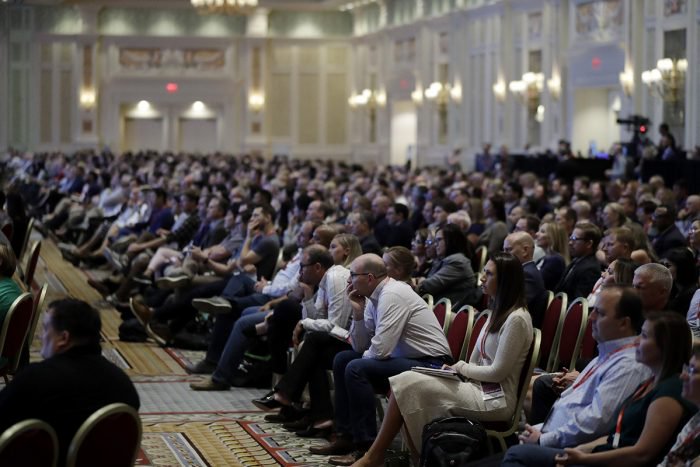Automation won’t make workers irrelevant, the consultant and author says.

Human Resource Executive’s HR Technology conference at the Venetian wrapped up Friday in Las Vegas. (Photo by Isaac Brekken for Human Resource Executive)
The largest-ever HR Technology & Exposition Conference came to a close Friday in Las Vegas with a closing keynote from Ravin Jesuthasan, managing director at Willis Towers Watson, who spoke about the future of work and the role that technology and HR professionals play in it.
“The pace of change that we’re seeing now is of a magnitude greater than anything we’ve seen over the last [few decades],” he said. “HR is changing from being the steward of employment to the steward of work …. There has never been a better time to be in the HR profession.”
Video: See Josh Bersin’s interview about his report with HRE.
Here are three takeaways from Jesuthasan’s keynote.

Ravin Jesuthasan, managing director at Willis Towers Watson
Work is going to involve many different arrangements and reinvention is key. That includes traditional employees to gig workers to volunteers in addition to work done by robots and artificial intelligence. “We need to recognize that we as individuals will need to reinvent ourselves,” he said. “Our children will need to reinvent themselves three or four times [during their careers].”
Related: More HR Tech 2019 coverage here.
Automation is here, but it doesn’t mean it’s replacing employees. To be sure, automation is having a big impact on the workplace and how companies function. Employers report automation is improving collaboration and information sharing and also enables employers to use more non-employee talent, according to a Willis Towers Watson survey. But at the same time, it’s not replacing human skills, Jesuthasan said. In fact, according to the consulting firm, nearly half of transforming organizations are using automation to create new types of work for humans. Employers also report automation requires them to pay more for employees with certain skill sets.
VIDEO: See Josh Bersin’s interview about his report with HRE.
Employers need to ensure employees stay relevant. Forget just competitive pay—employees want employers to make sure their skills are useful and relevant, especially as the workplace evolves, Jesuthasan said. Going forward, a key HR skill will be to curate the optimal set of experiences for workers, including rewards, development and engagement. “The most compelling reason for joining or staying at an organization is the ability of my organization to keep me relevant, to ensure my skills are relevant in a world that’s changing,” he said. “Recognize that learning and development are the new centerpieces of the employee experience.”


Recent Comments